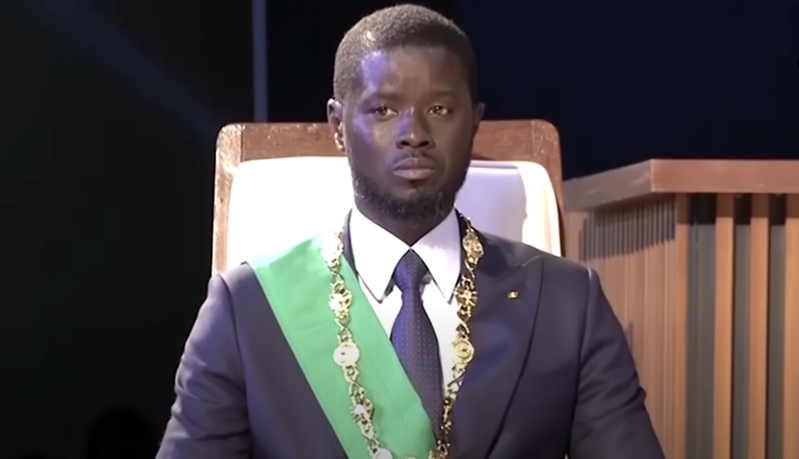
Senegal’s Bassirou Diomaye Faye was sworn in as the country’s 5th president on 2 April, just 20 days after he left prison. The 44-year-old is now Africa’s youngest elected president following a dramatic win against former President Macky Sall’s preferred candidate, former Prime Minister Amadou Ba.
Faye was arrested and imprisoned in April 2023 after his Facebook post accusing judicial officers of corruption was deemed as a threat to state security. Faye, a former tax inspector, campaigned on a platform of fighting corruption, strengthening national sovereignty and tackling youth unemployment.
The win by Faye is seen as a triumph by the youthful electorate that rallied behind Faye and Ousmane Sonko. 49-year-old Sonko, who was also released from prison days before the election, is one of the founder members of the winning party, African Patriots of Senegal for Work, Ethics and Fraternity, Patriots du Senegal party (PASTEF).
Sonko is considered the de facto leader of Senegal’s resistance and was also jailed and banned from participating in the elections for alleged defamation. One of Faye’s first executive duties was to appoint Sonko as the country’s Prime Minister.
“We’ll give it everything we’ve got. We will spare no effort to achieve what we have promised the Senegalese; a break with the past, progress and definitive change in the country,” said Sonko, hours after Faye was sworn in.
The election, which was initially slated for February 25, was rescheduled for December 2024 by President Macky Sall. However, a constitutional court overturned Sall’s order and issued amnesty to all political detainees effectively averting a crisis.
Although the outgoing administration made significant progress in the economic and governance front, the last term of Sall’s presidency was marred by protests by thousands of young Senegalese who were against the push by the former ruling party to extend President Sall’s tenure beyond the constitutionally allowed two terms.
About 1,000 people, mainly the youth, were jailed and several lost their lives in the series of protests that started with the arrest of Sonko and Faye last year and spilt over to 2024.
Dakar-based journalist, Malick Cire Sy, told Christian Daily International that the harassment and prosecution of the protestors and PASTEF leaders rallied the youth behind Faye and Sonko.
“There will be expectations (by the electorate) to solve the unemployment issue, put an end to favouritism in recruitment, and transparency in all commercial and governance activities,” said Cire Sy.
Analyst, Catherine Lena Kelly, said a combination of events led to Faye’s spectacular win.
“The dynamics of support within the coalitions of the leading candidates thus seemed to be characterized by two tendencies: solidarity within the Faye camp and division within the Ba camp,” noted Kelly, in a post published by the Africa Center for Strategic Studies.
One of the promises by Faye upon his inauguration is to strengthen its commitment to the Economic Community of West Africa States (ECOWAS), the regional political and economic union that has 15 member states including Nigeria, Ghana and Cote d’Ivoire. The commitment is an important boost to the beleaguered regional bloc which has lately found it difficult to exert its authority after Mali, Burkina Faso and Niger withdrew from the community and formed the Alliance of Sahel States.
The three countries, which are now ruled by the military after coups ousted former long-serving leaders, have united in response to Ecowas’ economic sanctions after the coups and also to combat the growth of Islamic jihadists in the Sahel region which includes the three countries. The US Office of International Religious Freedom (IRF) 2022 report states that deaths attributed to terrorism in Burkina Faso rose to 1,135 in 2022 from 759 in 2021.
“Terrorists killed or kidnapped (moderate) imams, other clergy, and worshippers, while attacking and destroying mosques, churches, and animist's places of worship,” noted the IRF office, quoting the Institute for Economics and Peace Global Terrorism Index.
Although the focus of countering the jihadists for the past decade has been on Mali and Burkina Faso, Senegal is wary of the continued influence and spread of Islamic militants that have been emboldened by instability in neighbouring Mali. However, the peaceful electoral process and the restoration of order by the judiciary in one of West Africa’s most advanced democracies has stabilized the country and offered new hope for the youthful majority population in the region.
In his inauguration speech, President Faye promised to safeguard this stability. “In this work of building a new Senegal, I shall work tirelessly to preserve peace and national cohesion. I bear in mind that our most precious resource remains our country’s political stability.”





